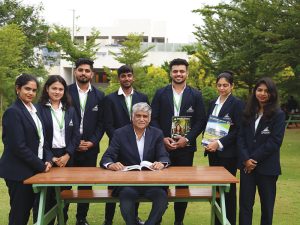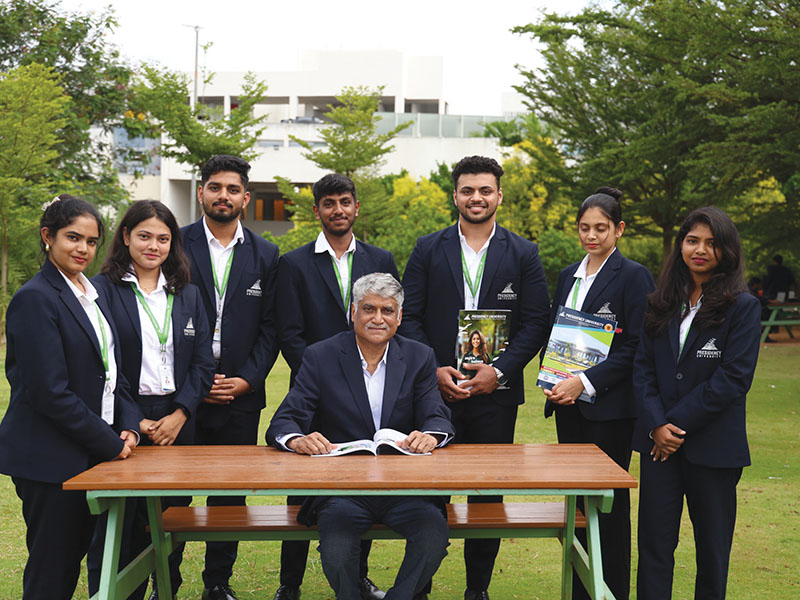21 Higher education leaders racing to develop india’s high-potential human resource: Nissar Ahmed
Nissar Ahmed
Chancellor, Presidency University, Bangalore

Nissar Ahmed is Chancellor, Presidency University (estb.2013) and chairman of the Bengaluru-based Presidency Group of Institutions (PGI, estb.1976) which comprise eight CBSE/CISCE-affiliated schools, four undergrad/postgrad colleges and Presidency University with an aggregate 30,000 students and 2,500 teachers.
Objectives set for Presidency University for India’s 100th Freedom Anniversary in 2047.
We have set the following goals: Reinforce our teaching-learning into a student-centric ecosystem providing equal access to skills-acquisition irrespective of caste, creed, religion, race or gender; develop and retain competent teaching resources aligned with best global standards of teaching-learning; develop and sustain a research-focused university, creating an active and robust research community among students and teachers; initiate and sustain robust international mobility programmes for students and faculty through differentiated partnerships with like-minded yet reputed universities; and establish a platform for digital learning by factoring MOOC as part of the university curriculum canvas.
How satisfied are you with your progress thus far?
Very satisfied. Indeed over the past decade, we have migrated from being a traditional university of learning to an institution of experiential learning; introduced a plethora of choice- based electives and are focused on outcomes-based learning.
Focus on research publications and sponsored research has shown a steep upward curve. Our goal is to transform from being an academic institution into a research-centric university.
What are your major initiatives to radically contemporise your syllabus/curriculum?
Our Board of Studies comprises representatives from domain specific and associated industries, who keep us abreast with the latest developments/advancement in their industry sectors. Our deans and faculty collaborate actively with these industry representatives to design and develop contemporary curriculums.
How satisfied are you with your connect with Indian industry and business?
Deeply satisfied. We ensure that our Board of Studies members keep us updated of the new technology-disrupting start-ups that spring up every now and then. We have established an incubation and innovation hub under the name and style of Presidency Launch Pad, a company established under Section 8 of the Companies Act. More than 150 incubatees and our students and faculty members are exposed to new technology developments and involved with incubatee companies in many instances.
R&D and innovation are widely perceived as Indian academia’s infirmity. What’s your institutional response to create new knowledge?
In Presidency we strongly believe that a university of repute has to encourage research for community well-being and advancement. Therefore we are firm in our belief that the best teachers are those who are equally adept at research. Research and academics are two sides of the same coin. We encourage our teachers to publish at least two papers per year in Scopus indexed journals. Students are also continuously engaged in research projects under the guidance of faculty mentors.
What’s your prescription for transforming India into a $30 trillion GDP economy by 2047?
The Viksit Bharat 2047 target is ambitious but not impossible. To attain the $30 trillion GDP target, India should record an annual GDP growth of around 9 percent per year, which according to government estimates will result in per capita income of Rs.15 lakh per annum — cf. Rs.2.2 lakh per year currently.
Higher education institutions have to contribute by way of providing contemporary, quality education that equips students with cutting-edge technological skills; build an ecosystem that fosters research and innovation; promote incubation centres to encourage start-ups and entrepreneurship; encourage academic-industry collaboration for research and internships.
How optimistic are you about India’s future growth and development?
I am very optimistic that India is poised to become an economic powerhouse by 2050. We are on the verge of becoming the third largest economy worldwide. There is new awareness and emphasis on innovation, digital transformation; state-of-the-art infrastructure development supported by an energetic start-up culture.
With a large youth population and proliferation of quality private universities, the country will soon have a huge talent pool of skilled professionals enjoying ease of doing business in India.
Also Read: Presidency University to launch interdisciplinary school on Derozio Building

















Add comment